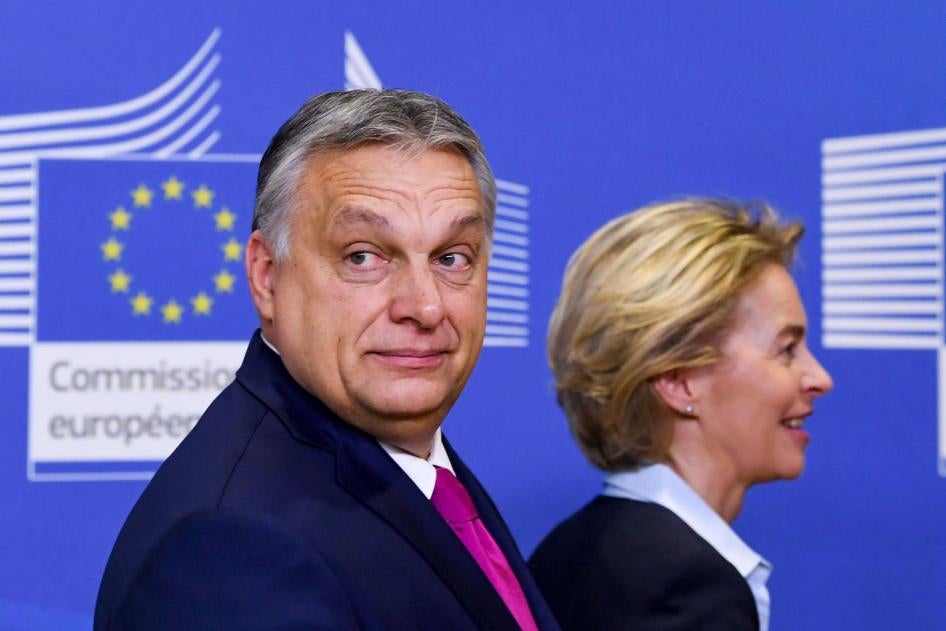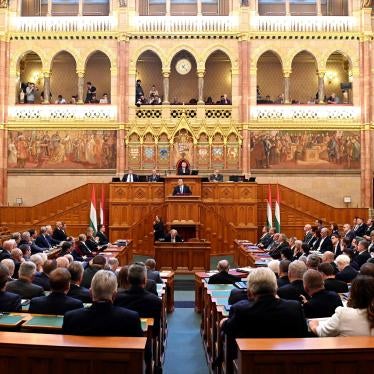EU leaders took momentous decisions last week in Brussels as they agreed to open EU membership talks with Ukraine. For weeks Hungarian prime minister Viktor Orban had threatened to block the prospect, together with the planned €50bn in aid to Ukraine as part of the review of the EU budget.
At the doorstep to the landmark EU summit on 14 December, Orban claimed Ukraine had not delivered expected reforms.
He insists that EU membership is merit-based — which indeed it should be — but his own government has bluntly flouted the norms and values upon which the EU is founded.
Under his leadership, Hungarian authorities routinely attack and undermine the rule of law and democratic institutions.
The government claims extraordinary powers to rule by decree and sidestep parliamentary process by perpetual extensions of "states of danger".
Independent journalists, media and civil society organisations face smear campaigns by public officials and pro-government media. Discrimination and vilification of lesbian, gay, bisexual, and transgender (LGBT) people and Roma persist, as do unlawful pushbacks of migrants and asylum seekers.
The EU has been right to step in including through the EU Court of Justice, European Parliament scrutiny, Commission infringement proceedings, financial conditionality and its primary treaty instrument to address serious breaches to the rule of law — the article 7 procedure of the Treaty on European Union (TEU).
But the EU's actions have so far had limited results.
Independent observers agree that while Hungary's government has adopted some measures in response to EU requirements, these fall short of what is needed to alleviate concerns over the rule of law in Hungary.
As the summit painfully illustrated, EU leaders have also failed to contain Orban's ability to hijack EU foreign policy.
In May 2023 in an effort to obtain suspended EU funds, the Hungarian parliament passed a law addressing some issues with the independence of the judiciary. But the law failed to guarantee the integrity of the parliamentary lawmaking process and the independence of key judicial bodies, among other issues.
Hungarian civil society has criticized the government's last ditch efforts in early December to make further amendments to meet EU benchmarks.
Instead of holding the line, the EU has once again failed to effectively hold Hungary to account.
On the day before the landmark summit, the European Commission concluded that Hungary had met conditions linked to judicial independence and unblocked €10bn of EU cohesion funds. It maintained a freeze on €21bn in other funds linked to Hungarian authorities' persistent breaches of rule of law and human rights norms.
The timing of this step on the eve of crucial European Council decisions on Ukraine that Hungary opposed raises many questions, including of political horse-trading.
While EU member states have continued to scrutinise Hungary under article 7, they have avoided putting to a vote whether Hungary's actions breached EU values or to adopt respective recommendations to remedy these breaches.
The article 7 procedure is a singular and critical tool for the EU to protect its treaties and functioning as a community of like-minded states. If taken to its ultimate conclusion it could entail suspension of certain membership rights, including voting rights.
Yet, member states have shirked their responsibility to adopt any concrete, even preventive, measures under the instrument, limiting their action to political dialogue since the procedure was launched in 2018.
On 14 December EU leaders succeeded in greenlighting EU membership talks for Ukraine paving the way for comprehensive reform of Ukraine's human rights, institutional, and rule of law framework in line with EU acquis. EU accession has offered the most powerful vehicle for reform and democratization on the European continent.
But unless the EU is firm on rule of law at home and EU member states assume the responsibility of their mandate to hold Hungary to account with immediate action under article 7 at the Council, Viktor Orban would not only destroy democracy in Hungary and undermine the EU as a union of values — he would derail the reform potential of enlargement for Ukraine and other candidate countries too.
Under current unanimity rules, Hungary could politicize and use for its own purposes every next stage of enlargement, including basic steps such as opening and closing of acquis chapters.
Orban indeed vowed immediately after the summit to do exactly that. This would have a deeply demoralising effect on Ukraine's commitment to deliver on the EU reform agenda and undermine the EU's credibility before all candidate countries.
In addition to being an argument for how wider application of Qualified Majority Voting could support human rights and democratic reforms, this is another case for why the EU cannot continue to tolerate the current Hungarian government's excesses at home and abroad.
Orban acquiesced on accession talks, but Hungary did block the substantial package of aid to Ukraine, keeping a lever in reserve to dilute scrutiny and obstruct EU foreign policy.
The EU should not allow the reform potential of its enlargement policy to be held hostage by the leader of a single member state, who refuses to respect the very foundational values of the EU.










